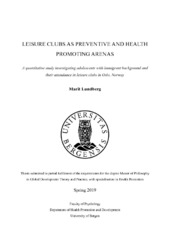Leisure clubs as preventive and health promoting arenas
Master thesis
Permanent lenke
https://hdl.handle.net/1956/20082Utgivelsesdato
2019-06-18Metadata
Vis full innførselSamlinger
- Master theses [165]
Sammendrag
Background: Attending leisure clubs is the second biggest leisure time activity for adolescents in Norway. Unlike organised sports leisure clubs often has a low or no membership fee, which makes it accessible for everyone regardless of their socio-economic resources. Studies have found that there has been an increase of adolescents with immigrant background who attend leisure clubs, especially in Oslo. These clubs have the ability to reduce social inequality in health by focusing on preventive and health promoting measures. Objective: This study will examine the characteristics of and the factors that predict attendance in leisure clubs among adolescents with immigrant background in Oslo. In addition, the study will discuss how leisure clubs could be preventive and health promoting arenas. Methods: A quantitative study was conducted by using the survey Young in Oslo 2018. The participants were adolescents with immigrant background in Oslo between the ages of 13 to 16 (N=4708). Descriptive and bivariate analyses (Chi-Square tests of independence and independent sample t-test) as well as logistic regression were conducted. Findings: The findings showed small differences in the characteristics of adolescents with immigrant background that attended and did not attend leisure clubs. Sex, problem behaviour, bullying, experienced bullying, experienced cyber bullying, perceived resources in local community, substance and alcohol use and life satisfaction predicted attendance in leisure clubs. Discussion and conclusion: The findings of this study support the assumptions that strengthening communities are important for attendance in leisure clubs. However the study did not find huge differences in behavioural problems among adolescents that attended and did not attend leisure clubs, which could indicate that there is too much focus on the preventive aspects of leisure clubs. The findings suggest a stronger focus on health promotion and implementation of universal measures that have the ability to empower adolescents.
